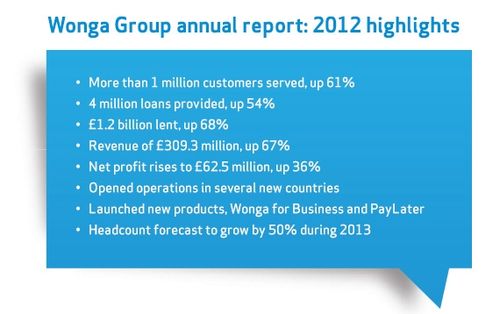
Today’s news in
Britain is all about payday lenders once more due to a grilling of Wonga in front of a Parliamentary Committee yesterday.
It’s amazing the
emotions such lenders activities ignite.
They make
politicians and the media angry because they charge high interest rates … and
yet they make their customers happy by providing short-term loans at completely
transparent pricing rates.
This is the battle
and, if you ask customers do you
understand these interest rates, the answer is probably yes for Wonga and
no for banks.
- Do you understand
how APR is calculated? - Do you understand
the charges for overdraft fees? - Do you understand
how this credit facility works?
The answer, when you
take out bank loans, accounts and cards, is often ‘no’ because the bank wraps up
all such fees in the small print. The T’s
and C’s that no-one reads. It is only
when the customer is hit with these charges that they see them, and they don’t
see them coming so they scream and shout in pain, anger and frustration.
With Wonga and their
brethren, it does not work that way.
As you open ‘an
account’, the home page screams
at you: YOU WILL BE CHARGED HIGH INTEREST FOR THIS.

But then their customers appreciate this transparency.
And it’s not surprising when you realise that they do not
feel they are getting roped into something that they cannot pay back.
Most of them anyway.
A bit like using prepaid cards online to avoid fraudulent
access to your main bank account, the savvy consumer uses Wonga to cover
short-term emergency funding to avoid being stitched up by a bank overdraft fee
or borrowing from friends.
In fact, most consumers think that borrowing from Wonga is a
bit like borrowing from a friend. Just
without the embarrassment. If you were borrowing
from a friend, you may say that you’re borrowing £100 and will payback in a
week with an extra tenner in it for your friend. That’s how Wonga likes to portray itself.
To add to this impression of friendliness, fairness and
transparency, the firm have just produced an interesting film called 12 Portraits.
The film is meant to show how Wonga fits in with everyday
life in Britain today, and that is exactly their argument.
It is not Wonga’s model that is wrong but, if their role is
wrong, it is due to a government and society that has created the need for it.
Britain would not need payday lending if Britain had a fair
distribution of wealth, an easy way to source funding when needed, or a bank system
that was totally transparent and easy to understand.
That’s Wonga’s argument anyway.
On the other hand, there are good reasons to challenge a
business that makes millions in profit from fees and late payment charges.

Source: Wonga's 2012 annual review
Wonga generated revenues of £309.3 million against £1.2
billion lent in 2012, or an income of over 25 percent.
That equates to a £1 of income generated from every £4 lent through
fees and charges.
Kindof puts it into perspective as that’s one helluva whack
of charges (365 percent interest rates on a simple annualised basis, or 1 percent
interest per day plus transaction charges of typically £5.50 per loan).
Wonga also makes most of its money from those who cannot
payback, with 20 percent of borrowers ending up in default. That soon steers people into trouble, as I
blogged about before.
This is again not necessarily Wonga’s fault, as they are
totally transparent about what happens if you don’t payback, and is more a
result of people’s attitudes to money.
For example, an Ipsos-Mori survey, commissioned by the Government’s
Department for Business Innovation & Skills that was published last month, found
that people had a completely different view if they looked at Wonga from a “customer”
versus a “citizen” view. As a customer,
borrowers are grateful for the financial lifeline; as a citizen, people were
worried that those in desperate need were being left vulnerable and exploited.
This is the nature of money, life and Britain today, as demonstrated
by Wonga, 12 Portraits and the two
surveys from Populus and Ipsos-Mori.
Meanwhile, we have the headline grabbers like Ed Miliband
(leader of the Labour Party) saying that:
“Payday lenders don't speak for the silent majority. They
are responsible for a quiet crisis of thousands of families trapped in
unpayable debt”;
“The Wonga economy is one of the worst symbols of this cost
of living crisis”; and that
this is “a company where in one year alone their bad debts
reached £120 million. An industry in which seven out of 10 customers said they
regretted taking out a loan. With half saying they couldn't pay it back.”
Wonga would retort that their £1.2 billion lent is from
their own cash reserves. They are taking
the risk here. The £120 million of bad
debt is their potential loss.
The politicians didn’t agree of course and, in a ding-dong
discussion in Parliament yesterday,
the payday lenders met the government to try to work out the issues.
So, we can expect a real battle in the future, with many calling for caps on interest
rates charged and better management of late payers.
I am sure that will happen but tend to fall into the middle ground
here, accepting that Wonga and payday lending is a reflection of life in Modern
Britain and more a fault of the government and banking system of finance than
the fault of the company who exploit the issue.
For more background on payday lending and Wonga, I’ve
written quite a lot:
- Wonga: another web disruption for
loans, February 2009 - Need money fast? May
2010 - An explosion of payday loan firms,
February 2011 - Poor are #1 prey for financial
predators, June 2011 - Why Wonga Will
Wrestle With Regulators, July 2011 - The real rip-off
culture ... is not Wonga?, August 2011 - Whatever you think, Wonga is doing well, July 2013
Chris M Skinner
Chris Skinner is best known as an independent commentator on the financial markets through his blog, TheFinanser.com, as author of the bestselling book Digital Bank, and Chair of the European networking forum the Financial Services Club. He has been voted one of the most influential people in banking by The Financial Brand (as well as one of the best blogs), a FinTech Titan (Next Bank), one of the Fintech Leaders you need to follow (City AM, Deluxe and Jax Finance), as well as one of the Top 40 most influential people in financial technology by the Wall Street Journal's Financial News. To learn more click here...

